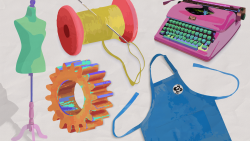As someone who enjoys listening to and thinking about rap music, I’ve always had a hard time appreciating Gucci Mane. His tinny, dime-a-dozen synth beats make a mockery out of the sampling process that hip-hop was built on, and his unwillingness to rap about anything outside of his cars, jewelry, and guns, combined with his general aversion to making his lines actually rhyme, made most of his admittedly prolific output tough to stomach. His label, So Icey Entertainment, is stocked with such borderline-retarded non-rappers as OJ da Juiceman and Wacka Flocka Flame; his entire movement embodies everything that New York hip-hop purists hate about the iced-out, Stanky Legg-shaking South.
It’s hard to believe, then, that in between serving two separate jail sentences, Gucci owned 2009, dropping, by my count, no less than six official mixtapes (three of them on the same day), his major-label debut album, and appearing on countless guest verses. Instead of changing his style to more closely fit the traditional rap star archetype, he simply bludgeoned listeners into accepting his M.O., releasing song after song filled with nothing but drugs and jewels. Somewhere along the line, though, it clicked—through nothing more than stubborn persistence and the magnetic allure of his gigantic personality, Gucci became something more than his fellow kush-puffing Southern compatriots, morphing into a national star.
It’s tough to get past the relentless misogyny and incessant drug talk, but underneath that baritone, stuffy-headed drawl is a genuinely charismatic rapper with a deceptive feel for beats. His delivery may be monotonic, but he has an interesting ability to squeeze extra syllables into lines and subtly shift flows mid-verse. His lyrics are admittedly one-dimensional, but he’s blessed with an almost preternatural ability with catchphrases. Many rappers develop a signature one-syllable identifier to shout at the end of verses, but Gucci has at least five (my personal favorite: “skurt!”).
Though he’s not respected as a lyricist and often maligned for his almost exclusively materialistic subject matter, his deadpan delivery makes some of his lines laugh-out-loud hilarious. His penchant for the absurd rivals Cam’ron at his Purple Haze peak: he alternately indulges in offbeat sex raps (“Ass fat as two basketballs/Gucci finna dunk on her”) or left-field thug metaphors (“.45 in the club/I could kill a hippopotamus”). He’s simultaneously menacing and charming, kooky and straightforward, egregiously over the top and down-to-earth.
While aging veterans Jay-Z, Eminem, and 50 Cent (now geezers in rap years) released unexciting, critically panned albums in 2009, Gucci’s acceptance of his position as rap’s populist iconoclast helped him gain a following that extended well outside the South. Gucci succeeds without the internal rhyme schemes and tongue-twisting verbal acrobatics that rap fans love, preferring to hammer home his themes of drug talk mixed with Atlanta pride. “I’m from East Atlanta six/where the boys dump bricks/and we don’t bump The Blueprint 3,” he raps on “Classical,” a direct jab at Jay.
Of course, Gucci isn’t the first libelous Southern rapper to take a shot at the king. After gradually building a devoted following by dropping a torrent of mixtapes, Lil Wayne proclaimed himself the best rapper alive and topped the charts with a crossover dance hit that compared fellatio to candy. In many respects, Wayne paved the road down which Gucci now drives his yellow Lamborghini, preparing rap fans to sift through mountains of mixtapes to access his music and popularizing a brand of zany, free-associative rhymes of which Gucci’s lines are a bastard cousin. Wayne is by far the more talented emcee in the traditional sense, but Gucci has willed himself to the top through the sheer force of his personality, mixing impeccable street cred with the kind of goofy charm that makes critics swoon.
Hip-hop is entering a brave new world. Enjoying more commercial viability and worldwide cultural prominence than it ever has, it is simultaneously facing crises on multiple levels. Its biggest star is going to jail for a year, and its next-biggest star is a half-Jewish Canadian who played a disabled kid on a teen sitcom. Underground talents release promising mixtapes for free, then get swallowed up by major labels where their creativity withers behind suffocating 360-degree deals. The only people making money are despised as inauthentic sellouts. The only thing that everyone agrees on is that the industry is fucked. Maybe it takes someone as irreverent and unique as Gucci Mane to jolt the genre back to life. Who else would have devoted an entire song to bragging about how much yellow stuff he has, or boasted that he “raped the game without a rubber/now my bank account is pregnant”?
This new decade could take us anywhere. Here’s hoping Gucci is at the forefront of wherever that may be.




The Blueprint 3 was far from panned by critics. Of course it isn’t Jay’s best work but it’s pretty awesome how relevant he’s stayed at his age.
And just because Gucci oversaturated the market, that doesn’t mean he deserves our attention. The dude is whack, unless we’re talking about his rap over the “Shine Blockas” beat. But even you could rap over that one and sound passable, Mr. Quigley.
[…] 2009, he was back at it on “Classical,” taking a “direct jab at Jay” with the line, “I’m from East Atlanta six, where the boys dump bricks, […]